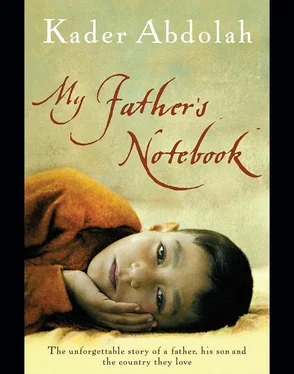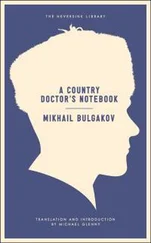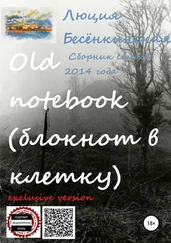This time there was no old woman behind the curtains. “Here’s the frying pan, the bread, the tea, the cheese. We’ll leave you to it, Tina,” they said and left.
They let matters take their own course.
It had been ordained by fate, by life itself. And Tina became pregnant.
One cold night in November, Tina lay under the blankets by the tiled stove, a special stove that people slept beside during particularly cold winters. She pressed her foot against Akbar’s back and woke him up. He knew the baby was due, so he leapt out of bed and lit the oil lamp.
“Are you in pain?”
“Hurry,” Tina signed, “go and get the midwife.”
The men of the family arrived even before the women did. Someone brought a large samovar. Someone else a large brazier. Kazem Khan brought his yellow opium. Who knew? Maybe they’d have something to celebrate.
Kazem Khan was sure they would, since he had consulted the Koran. The answer had come in the sura of Mary:
Wa azkur fi al-kitab maryam eze antabazat min ahleha makanan sharqyan …
When Mary went away from her family to an Eastern-looking place and took a veil to hide herself from their eyes, Allah sent her his Spirit in the form of a perfect man. She said: “I seek my refuge in Allah. Leave me.” He said: “I am only a messenger of the Lord. You are to bear a son.”
The men sat in a circle in the guest room and waited in silence. It took so long that the fire almost went out. The men all looked at Kazem Khan, who had lit the brazier so he’d be able to reach for his pipe the moment the baby was born. There was an ominous silence, then suddenly they heard the wail of an infant from the next room.
According to family tradition, no one was allowed to break the silence yet. So the midwife gestured: “A son.”
Kazem Khan smiled so broadly that his gold tooth gleamed. A while later the oldest woman in the house took Ishmael in her arms and took him into the guest room. No one spoke, because the first word, the first sentence to reach the baby’s unspoiled mind had to be a poem — an ancient melodic verse. Not a word uttered by a midwife or an aunt’s joyful cry, not an everyday word from the mouth of a neighbour, but a poem by Hafez, the medieval master of Persian poetry.
Kazem Khan stood up, took the volume of Hafez, closed his eyes and opened the book. At the top of the page, on the right-hand side, was the proper poem to be chanted into the child’s ear. Kazem Khan brought his opium-scented mouth to Ishmael’s ear and whispered:
Bolboli barg-e gol-i khosh-rang dar menqar dasht
wa andar-an barg o nava khush nalaha-ye zar dasht.
Goftam-ash, “dar ’ayn-e wasl in nala o faryad chist?”
Goft, “mar-ra jilva-ye ma’shuq dar in kar dasht.”
A nightingale once sat with a bright petal in its beak ,
But this memento of its loved one merely made it weep .
“Why bewail this token of your heart’s desire?” I cried .
“It makes me long for her all the more,” the songbird sighed .
The first words to reach Ishmael’s brain were about love, sadness and the longing for a loved one.
Then Kazem Khan handed the child to Aga Akbar. “Here, your son!”
The women uttered a cry of joy.
Kazem Khan’s voice was the first voice Ishmael heard. Or so he thought. Years later, when he was trying to decipher his father’s notebook, he discovered that things hadn’t happened quite that way.
Ishmael had always had trouble with his left ear. His father knew why. He’d tried to tell his son something about the midwife and the book and the ear and the stupidity of a new father, but Ishmael hadn’t understood.
What actually happened (according to Aga Akbar’s notes) was this:
I was sitting with the men. I didn’t know if the baby had been born
yet. Suddenly I saw Kazem Khan’s gold tooth gleam. I knew then that the baby had been born. My aunt came in with the baby in her arms. I was afraid the baby would be a deaf-mute like me, and I wanted to see if he was deaf. I know it was wrong, but suddenly I stood up, ran over to my aunt, took the baby from her, put mymouth to his ear and spoke into it. The baby screamed and turned blue. Kazem Khan snatched him from me and shoved me out of the house. I went and stood at the window. Everyone frowned at me. I had shouted into the baby’s ear. Everyone said it would be damaged for good. It was stupid of me, stupid. Akbar is stupid .
Damaged? No, not really, but whenever Ishmael was sick, or under stress, or feeling discouraged, whenever he fell down and had to stand up again, a voice shouted in his ear. His father’s voice. Aga Akbar was always inside him.
Ishmael is in doubt. He isn’t sure he can
get his father’s story down on paper.
After long hesitation, he picks up his pen.

A well-known Dutch classic begins like this:
I am a coffee broker, and I live at No. 37 Lauriergracht, Amsterdam. I am not in the habit of writing novels or things of that sort, and so I have been a long time making up my mind to buy a few extra reams of paper and start on the work which you, dear reader, have just taken up, and which you must read if you are a coffee broker, or if you are anything else. Not only have I never written anything that resembled a novel, I don’t even like reading such things, because I’m a businessman. For years I’ve been asking myself what is the use of them, and I am amazed at the impudence with which a poet or story-teller dares to palm off on you something that never happened, and usually never could happen. If I, in my line — I am a coffee broker, and I live at 37 Lauriergracht — gave a statement to a principal — a principal’s someone who sells coffee — which contained only a small portion of the untruths that form the greater part of all poems and all novels, he would transfer his business to Busselinck & Waterman at once. They’re coffee brokers, too, but you don’t need to know their address. So, then … I take good care not to write any novels, or make any other false statements. And I may say I have always noticed that people who go in for such things generally come to a bad end. I am forty-three years old, I’ve been on ’Change for twenty years, so I can come forward if anyone’s called for who has experience. I’ve seen a good many firms go down! And usually, when I looked for the reasons, it seemed to me that they had to be sought in the wrong course most of the people had taken in their youth.
Truth and common sense— that’s what I say, and I’m sticking to it. Naturally I make an exception for the Holy Scrip ture….
Nothing but lies! …
Mind you, I’ve no objection to verses in themselves. If you want words to form fours, it’s all right with me! But don’t say anything that isn’t true . “The air is raw, the clock strikes four.” I’ll let that pass, if it really is raw, and if it really is four o’clock. But if it’s a quarter to three, then I, who don’t range my words in line, will say, “The air is raw, and it is a quarter to three.” But the versifier is bound to four o’clock by the rawness of the first line. For him, it has to be exactly four o’clock, or else the air mustn’t be raw. And so he starts tampering with the truth. Either the weather has to be changed, or the time. And in that case, one of the two is false ….
Nothing but lies, I tell you!
Читать дальше













